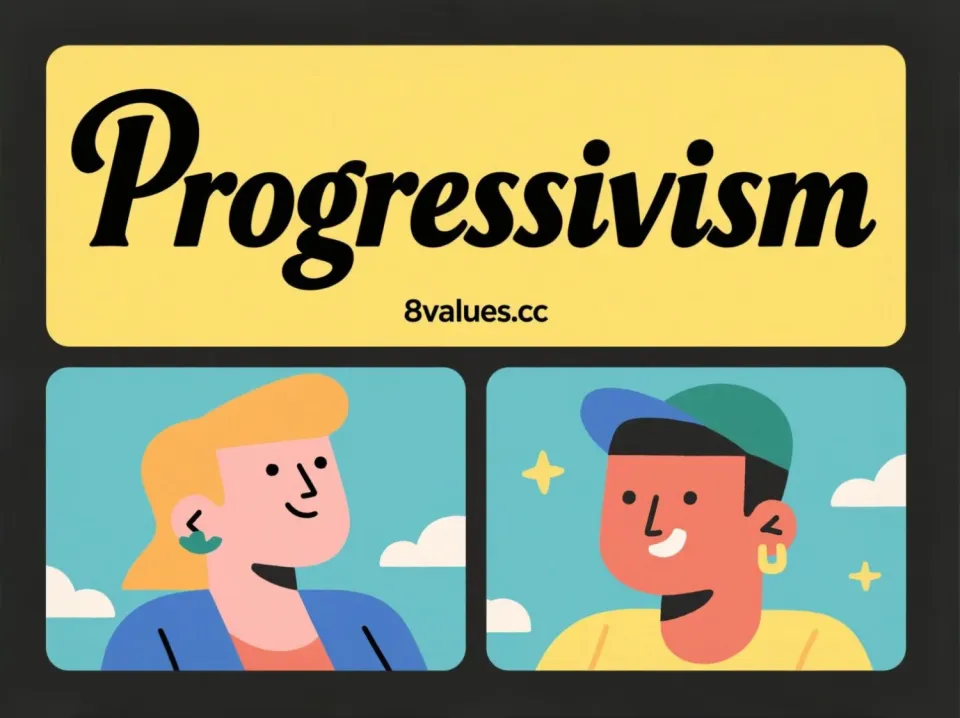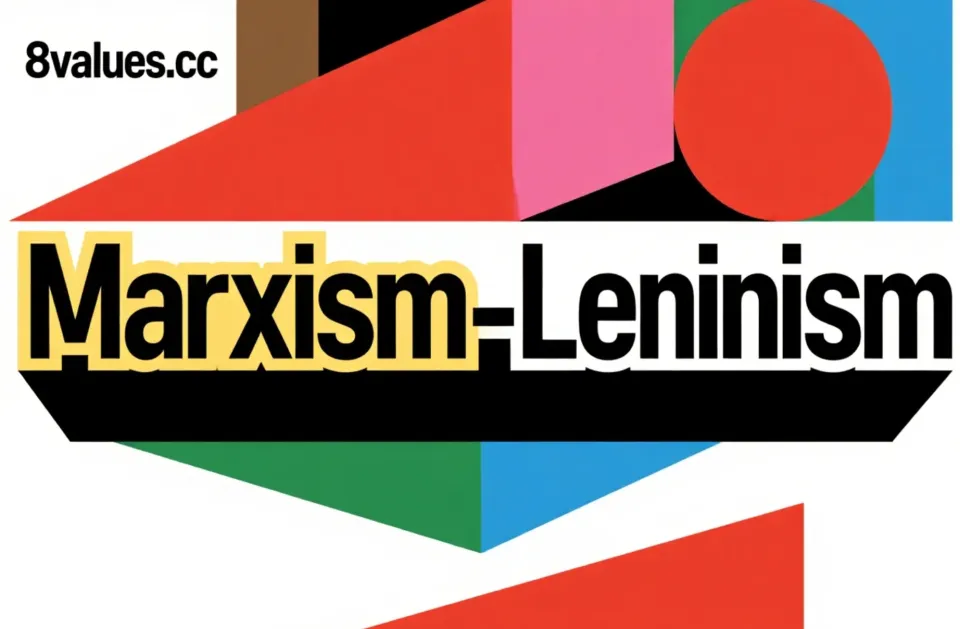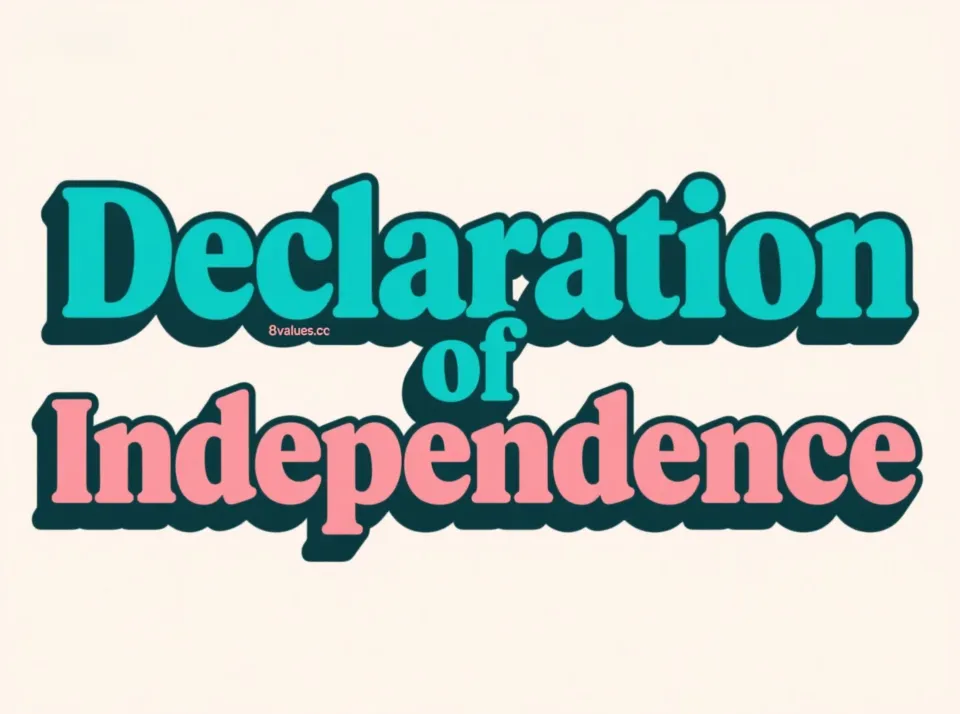Progressivism | 8values Interpretation of ideological ideology of political tests
Deeply explore the political philosophy and ideology of Progressivism, and understand its historical origins, core propositions, reforms in the progressive era of the United States, modern evolution and similarities and differences with other political trends. This article will explain this trend of thought that is consistent with social improvement in detail and explore its manifestation and far-reaching impact in the 8 values political tendency test.
Progressivism is a political movement and ideology that began in North America from the end of the 19th century to the present. It is rooted in the belief that human society can be continuously improved through political operations and attempts to improve human survival by promoting the development of politics, science and technology, economy and society. Progressives firmly believe that society can and should continue to progress through thoughtful actions, and this optimism constitutes its fundamental view of the future.
In the 8values political test , progressivism often represents a position of seeking positive change in the social, economic and political fields. It is not just a political label, but a philosophical attitude to look at the world, solve problems and shape the vision of the future.
The Philosophical Origin and Historical Background of Progressism
The philosophical roots of progressivism can be traced back to the Enlightenment era , when people believed that the level of European civilization had been improved by the influence and transformation of Enlightenment thought on politics, and believed that society could be improved by applying new empirical knowledge. 18th-century philosophers such as Immanuel Kant defined progress as a movement from barbarism to civilization, while Marquis de Condorcet predicted that political progress would involve the abolition of slavery, the increase in literacy rates, the reduction of gender inequality, prison reforms, and the reduction of poverty.
By the 19th century, the wave of industrial revolution and urbanization had greatly changed the social structure and lifestyle, but it also brought unprecedented challenges. The gap between the rich and the poor is becoming increasingly serious . For example, in 1890, the top 1% of the rich in the United States owned nearly half of the country's wealth, and by 1900 it increased to 87%. The manipulation of the market by monopoly enterprises has led to bankruptcy of small and medium-sized enterprises, and the market lacks supervision has become confused. Political corruption and collusion between officials and businessmen are common, and monopoly enterprises extend their tentacles to the political circle, making politicians the spokespersons of their interests. In addition, the influx of immigrants has also overwhelmed urban public services, and many people live in slums.
Against this backdrop, progressivism emerged and became a response to these "gilded age" problems. It seeks to address social, economic and political issues brought about by industrialization and urbanization through government intervention . Early progressives included thinkers such as Henry George, Edward Bellamy, and outstanding figures such as Herbert Croly, John Dewey, Woodrow Wilson and Theodore Roosevelt.
Progressiveism is deeply influenced by European thought, especially the dialectical historical view of German philosopher Hegel . He believes that history is a process of developing towards a higher level of free form, and is constantly improving through conflicts and synthesis of opposites (topic-antiograph-combination). Many American progressives have studied in Germany and brought Germany's educational model and political philosophy back to the United States, forming a progressive ideological foundation that emphasizes "expert governance of the country" and "scientific management".
The core concepts and propositions of progressivism
Progressivism is a collection of heterogeneous ideas, but its core ideas and propositions are common:
Pursuing social improvement and human perfection: Progressive utopian vision
Progressives generally hold an optimism that human society is moving towards a state of peace, equality and prosperity, and tends to believe that human beings are perfect. They believe that through government intervention, scientific and technological progress and education , human weaknesses can be overcome, an ideal society can be created, and even a certain degree of "paradise on earth". This utopian vision contrasts sharply with the conservative idea that humans and society are imperfect, and the idea that gradual change is advocated.
Strong government intervention: a governance model that transcends limited government
Unlike the liberal tradition that restricted the size of the government in the early days of the founding of the United States, progressives advocated expanding government functions and powers so that they could effectively regulate the economy, solve complex social problems, and safeguard the public interest. They believe that in the face of new challenges brought by industrialization, a "overly weak government is difficult to regulate business activities and deal with various complex social problems."
The core of progressivism is to emphasize the purity of public management , especially the concept of fair and selfless administrative managers . They believe that administrative power must exist and be centralized to respond flexibly to changing social environments. This concept led to the construction of an Administrative State , a government led by professional officials and capable of making quick decisions.
Attention to collective responsibility: the transformation from "rights" to "responsibility"
Progressiveism emphasizes that collective responsibility precedes individual rights . This means that individuals not only enjoy freedom, but also have the responsibility to act in a way that supports ideal society and builds a good society. In the business field, progressives believe that businesses are responsible to society and that the government has the right to demand these responsibilities, which is in opposition to the "laissez-faire" emphasized by liberalism. This emphasis on responsibility is also reflected in economic policy, that is, those who are capable of taking on more should pay more for society, such as through progressive taxation .
Experts' governance and administrative efficiency: the application of scientific and technological rationality
Progressives believe that modern science can transcend the perspective of traditional politicians, believing that only experts who have been educated in top universities, especially in the field of social sciences, can have the ability to govern. They view politics as an area that is too complex to cope with common sense alone, and advocate that experts in government agencies manage the economy, safeguard social well-being and guide the spiritual development of citizens. This leads to a preference for forced executive branches to achieve large-scale, radical reforms and reduce the corruption and stagnation that the legislature may bring.
Criticizing unrestricted capitalism: the pursuit of economic fairness and social justice
Progressives are critical of unrestricted capitalism , believing that it has led to serious economic inequality, rampant monopolies and labor-capital conflicts. They were one of the earliest advocates of antitrust law and welfare state philosophy. The core goal is to improve the human situation through government supervision, resource redistribution, labor rights protection and public services, and pursue social justice and public interests .
Redefining freedom: From natural rights to state granting
Progressives reject the ideas of American Founding Fathers about natural rights and limited government. They believe that human beings are not born free, and freedom is the product of human creation and a gift given by the state. Therefore, there is no eternal standard of right and wrong, and freedom is redefined as the main task of the state to realize its human potential . Education is regarded as the key to solving social problems, and through education, the "goodness" of human nature can be stimulated.
The Age of Progress in the United States (1890-1920): A Glorious Chapter of Reform
The 20 years between 1896 and 1916 were called the "Age of Progress" in American history . During this period, American society faced severe challenges such as polarization of wealth, the rise of monopoly enterprises, the influx of urban immigrants, and political corruption. Progressives represented by the urban middle class began to take the political stage, promoting a series of profound social, economic and political reforms .
Deepening of political democratization: Expanding people's participation
Progressives are committed to reforming political procedures , aiming to weaken the power of the political machine and strengthen citizens' control over the government.
- Direct democratic mechanism : introduce a direct pre-election system , whereby party voters directly elect party staff and nominate candidates, breaking the party leader's control over candidates. It also advocates citizens' initiative , referendum and recall , giving citizens the power to directly formulate, abolish laws and remove officials.
- Direct election for Senators : Promoting the passage of the 17th Amendment to the U.S. Constitution (1913), changing the right to vote for senators in Congress from state legislatures to direct election for voters in various states, further weakening the party leader's manipulation of politics.
- Women’s Suffrage : Progressive movement is a key force in promoting women’s suffrage . The passage of the 19th Amendment to the United States Constitution in 1920 granted women the right to vote for federal elections.
- Municipal Reform : A "strong mayoral system" was established in big cities. Mayors have the right to appoint and remove administrative officials, the right to propose legislation and veto, which greatly strengthens the administrative capabilities of local governments. In small cities, the "urban manager system" is promoted, and professional managers are responsible for urban management, drawing on the corporate governance model and improving government efficiency.
Economic Supervision and Labor Rights and Interests: Curbing Monopoly and Protecting People's Livelihood
Progressives firmly oppose monopoly capital and promote government regulation and intervention in the economy to solve market failure and the gap between the rich and the poor.
- Antitrust legislation : Pass the Sherman Antitrust Act and the Clayton Antitrust Act to restrict monopoly organizations and ensure market competition. For example, Rockefeller's Standard Oil Company was split as a result.
- Labor rights protection : Advocate the Children's Labor Law (Child Labor ban), the minimum wage system , workers' insurance and unemployment insurance , etc., and support the development of trade unions and labor organizations.
- Food and Drug Safety : Ensure consumer safety through the Pure Food and Drug Act (1906).
- Income Tax System : Promoting the adoption of the 16th Amendment to the U.S. Constitution (1913), the establishment of a progressive federal income tax, aimed at shifting the burden of government spending from working class to wealthy elites.
Social Culture and Environmental Protection: Improving Public Welfare
Progressives also focus on social moral and cultural development, promoting a number of social reforms.
- Public education : Promoting the popularization of compulsory education, John Dewey's progressive educational philosophy has profoundly influenced educational reform, emphasizing "education is life" and "learning from doing".
- Public health : Improve living conditions and public health in urban slums.
- Environmental protection : Progressives such as Theodore Roosevelt promote national park construction and natural resource protection .
- Prohibition : Some progressive groups also support the Prohibition, believing that it helps improve social problems.
Progressive Educational Philosophy: A Child-Centered Learning Revolution
In the field of education, progressivism is one of the most important schools of educational philosophy that influenced American education in the first half of the 20th century, and is sometimes called "new education" or "new education movement." It aims to oppose the old traditional schooling education in the late 19th and early 20th century America followed European formalism, adapting education to the needs of increasingly industrialized, urbanized and large-scale immigration.
Core Proposition
- Student Center : Education must be centered on children , respect their personality, encourage freedom and natural development, and use children's interests and needs as the basis for educational activities.
- Experience learning : emphasizes learning from experience , gaining knowledge through hands-on practice and problem-solving, and opposes rote memory and passive learning.
- Education is life : Dewey believes that education is life itself , not preparation for future life. Schools should become places for children to live in real life, and the course content should be related to children’s social life experience and interests.
- Teacher role : Teachers are instructors rather than commanders. The task is to create an activity environment, stimulate students' interest, and guide them to learn through inquiry activities.
- Democratic education : Schools should encourage cooperation rather than competition, cultivate the attitude and temperament that students need as citizens of democratic society, and promote free exchange of ideas and student autonomy.
John Dewey's Contribution and Experimentalism
John Dewey applied his pragmatic philosophy to the field of education, which had an extremely important impact on progressive education. He founded the University of Chicago Experimental School in 1896, practicing its educational philosophy and emphasizing the transformation of experience and reflective thinking . Dewey's "problem teaching method" and Kebertch's "design teaching method" are both famous teaching methods based on the principle of "learning from doing".
Controversy and reflection
Early progressive education also had an extreme individualistic and child-centered tendency. Critics believe it may lead to a lack of systematic and organizationality in school work , neglect the dominant role of teachers, scatter the knowledge students acquire, and may cause indulgence in children's morals and behaviors. Dewey himself also reflected on and corrected these shortcomings, emphasizing the need to strike a balance between freedom and guidance.
The modern evolution and complexity of progressivism
The concept of progressiveism has evolved continuously in history and is intertwined with other political trends.
Name conversion from "Progressiveism" to "Liberalism"
From the period of Franklin Roosevelt (FDR) 's "New Deal" to the 1960s, most of the progressive movements in the United States overlapped with modern American liberalism and dominated the political direction of the Democratic Party. Roosevelt was the first Democratic president to rename “progressiveism” to “liberalism.” However, since the civil rights movement in the 1960s, progressives have become dissatisfied with the liberal-led Democratic leadership, believing that it no longer focuses on issues such as working class and income inequality.
Since the 21st century, especially after Howard Dean served as chairman of the Democratic National Committee, the term “progressive” has been re-activated and has gradually recovered. Many leftists, including Obama, have begun to reuse the label of "progressives" to describe themselves.
The focus of modern progressivism
Contemporary progressives continue to advocate for policies to reduce economic inequality and systemic discrimination (such as institutional racism). They actively advocate social safety nets, labor rights , and oppose the impact of enterprises on the democratic process .
The focus of modern progressivism also extends to:
- Climate change and environmental protection .
- Racial justice and social equity .
- Universal health and public health .
- LGBTQ+ Rights and Gender Equality .
On the 8values Quiz official website , users can understand their tendencies in these dimensions by completing tests.
Progressiveism and related political thoughts
- and Liberalism : The two overlap on many policy issues (such as environmental protection and racial equality). However, the philosophical foundations are different: liberalism is based on natural rights and pursues the protection of individual freedom; while progressiveism is more inclined to utilitarianism , focusing on whether policies can effectively enhance people's well-being, and there is no specific "perfect society" endpoint, but rather pursues continuous progress. Economic liberalism focuses on the allocation of taxpayer funds, while economic progressivism guides capitalism to achieve social priorities through government laws.
- and Socialism : Both are concerned about social equality, but the goal of socialism is to establish a society that is fundamentally different from the existing society (such as public ownership and planned economy), while progressiveism advocates gradual social change and a mixed economy , and opposes radical revolution. Progressive ideas partially overlap with social democracy.
- and Populism : Both may act against the "elites" by claiming the interests of the "people". However, they differ in the definition of “people” : populists often define “people” as a specific ethnic or religious group and divide society; while progressives are more inclusive , emphasizing common ground and viewing differences as a source of cultural richness. Progressives often believe that democratic institutions and the rule of law can protect their values.
- Conservatism : Conservatism is usually the main opponent of progressivism, which advocates tradition, social stability, is skeptical of "progress" and social change, and tends to maintain a social situation that has proven stable.
The "dark side" and controversy of progressivism
Although progressiveism is committed to social improvement, there are also controversies and criticisms in its history and practice.
Potential authoritarian tendencies and social control
Progressiveism emphasizes administrative state, expert governance and centralization , which may lead to "bureaucratic autocracy" , restricting civic participation, and even suppressing dissent. Some critics argue that the utopian vision of progressiveism, if overemphasizes collective responsibility and neglects individual rights, may slide to authoritarianism and even provide justification for oppression of minorities. For example, in the “Gilded Age,” progressives took contempt for middle-class populists and tried to “discipline” the working class through moral reform.
Disgraceful records in history
- Eugenics : Progressiveism has historically been linked to the eugenics movement , which aims to “optimize” human populations by controlling fertility, such as eliminating people with disabilities, which is seen as the dark side of “progress”.
- Temperance Movement : Progressives have worked with the religious right to promote ban, intending to solve social problems through moral reform, but this top-down behavioral control is considered paternalistic intervention.
- Imperialism and Racial Prejudice : Some early progressives supported imperialism and external expansion , believing that this represents the progress of "civilization" and brings "law, order and justice" to all over the world. On the issue of race, the progressive movement also has weak links , and many mainstream reformists have a sense of racial superiority or avoid sharp apartheid problems. Progressive leaders such as Woodrow Wilson even believed in "Germanic theory" and believed that democratic ideas originated from specific "Aryan races".
- Fertility decline : There is a view that fertility has declined faster since 2010 in the Anglo-Circle and Scandinavia, which is related to the rise of woke politics, radical feminism, and the spread of "anti-family spirit" that are linked to modern progressivism.
Conclusion: 8 values Progressive Coordinates in Political Test
As a complex political philosophy and ideology, progressivism has far-reaching influence and has shaped the political and economic structure and global pattern of modern America. It provides a vision for continuous social improvement and drives many positive reforms, but it also comes with its inherent challenges and controversies.
On the 8 values test of political values , the progressive score usually reflects the individual’s emphasis on social change, government intervention, economic equity, and collective well-being. No matter what kind of ideology you are, understanding the historical context, core propositions and complexity of progressiveism can help to have a more comprehensive grasp of the contemporary political picture. You are welcome to conduct an 8values test , explore your political coordinates, and check all results for detailed interpretations of 52 ideologies , and gain an in-depth understanding of the charm and connotation of different political thoughts. In addition, you can find more articles on political theory and its real-life applications in our blog . A deeper understanding of progressivism may bring you deeper thoughts about individuals and society.






